IDC offers scathing prediction of certain death for Apple's iAd program
A report by the Wall Street Journal describes iAd as being a disaster, saying that advertisers' "response so far has been tepid," and complaining that marketers are turned off by iAd's "high price tag" and "Apple's hard-charging sales tactics and its stringent control over the creative process."
The report, titled "Apple's Rare Compromise," stated that "Apple is now discussing ad deals with a minimum commitment of just $400,000, according to a person familiar with the matter."
In reality it was publicly reported back in July that Apple had begun offering new iAd packages for as little as $300,000 to woo new advertising clients such as Citigroup and JC Penny, as Apple continued to expand its program outside of its initial million dollar iAd launch clients.
The article also stated that while Apple makes its money from hardware, not ad sales, the "state of the [iAd] service could affect developer loyalty to its platforms over time," imagining in print that software developers "are increasingly interested in building software for Android devices and getting advertising checks from Google," a daring observation made without any supporting evidence whatsoever.
Apple working with clients to improve iAd
The report did indicate that Apple's iAd team had established a training program with media buying agency OMD, to gain new insight into the mobile marketing world.
As part of the program, Apple reportedly invited 30 senior marketing executives from companies including Clorox, PepsiCo and JC Penny to its campus to engage in sessions with the company's designers and product teams. While a first for Apple, campus meetings like these are something that has become a "standard tactic" for "ad-dependent" tech firms "like Google, Yahoo and Facebook," the report noted.
IDC, which tracks mobile advertising market share, said Apple's share of the market has dipped from 19 percent at the end of last year (when it was tied with Google), to 15 percent this year. Google has edged up to a 24 percent share this year.
However, Apple entered the mobile advertising business by purchasing Quattro Wireless at the end of 2009, back when that firm had only a 9 percent share of the market. Google then had a 27 percent share, but as IDC reported last fall, Google, Microsoft and Yahoo "swiftly lost share" after Apple's iAd debuted in July 2010.
Google has since won back a portion of its initial position, but Microsoft has fallen from 10 to 7 to 6 percent share over the past three years, while Yahoo has dropped from 12 to 9 to 8 percent share over the same period.
Unlike the ad-centric paid search results businesses of Google, Yahoo and Microsoft's Bing, Apple entered the market with iAd to incentivize App Store development, and did not expect to turn a huge profit from its new advertising business.
The idea that Apple is dramatically losing market share in terms of ad dollars collected is therefore an intriguing way to portray iAd as a failure, particularly given the poor performance of the mobile ad market overall.
IDC predicts iAd will fade away
IDC analyst Karsten Weide failed to connect those dots when interviewed by the Wall Street Journal however, announcing instead that "Apple we believe will, over time, fade into the background," in the market for mobile ads, largely because Apple's iAd program only advertises to iOS devices.
Weide said iAd "was attempted to make sure that even consumers advertising experience on Apple devices was perfect, but it hasn't really worked."
Apple is currently straddled with 15 percent of the $630 million mobile ad market, putting it in third position behind Google and Millennial Media, but ahead of Jumptap, Microsoft and Yahoo.
Apple's share is actually larger than Microsoft and Yahoo combined, making it curious why the Wall Street Journal and IDC worked so hard to portray iAd's $95 million in revenue as a fumbling failure destined for certain death.
Apple paid $275 million for Quattro Wireless at the end of 2009, after losing its bid to acquire AdMob, which Google paid $750 million for in its parallel efforts to enter the mobile ad market.
 Daniel Eran Dilger
Daniel Eran Dilger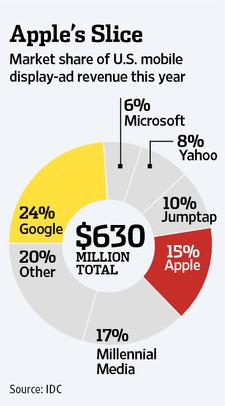


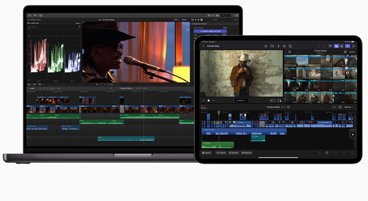










 Malcolm Owen
Malcolm Owen
 Marko Zivkovic
Marko Zivkovic
 David Schloss
David Schloss
 Wesley Hilliard
Wesley Hilliard
 Mike Wuerthele and Malcolm Owen
Mike Wuerthele and Malcolm Owen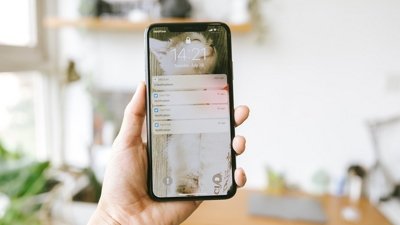
 Amber Neely
Amber Neely
 Bon Adamson
Bon Adamson
 Andrew Orr
Andrew Orr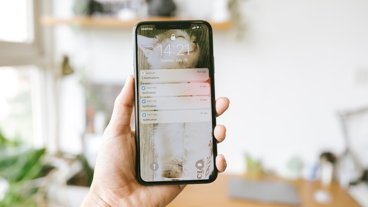
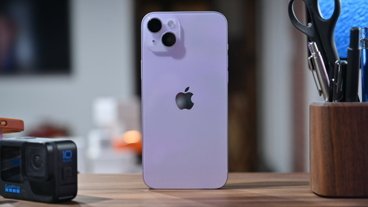
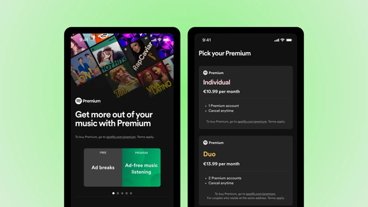







55 Comments
Let's face it, Apple is not an ad agency, but they should form revenue sharing deals with a number of smaller, smart, nimble agencies who are willing.
15% doesn't seem too bad for the time Apple has been at the mobile ad game.
The analysis seems rather short-sighted as it makes no mention of the potential game-changing effect that Siri will have on Google and others ability to advertise(at least on iOS). Once Apple is able to fluidly connect Siri with iAd it will be a whole other story.
15% doesn't seem too bad for the time Apple has been at the mobile ad game.
No kidding! Talk about some odd reporting. Quattro Wireless had 9% of the mobile ad business in late 2009. Apple bought them and, in 2 years, increased that to 15% of the mobile ad business.
And this is bad?
Not because they question iAD (I do as well) but their numbers are known to be dead wrong:
"Apple is currently straddled with 15 percent of the $630 million mobile ad market,"
Given we know for 100% certainty that Google alone has a $2.5 billion/year run rate on mobile (with 2/3 coming from iOS), the 630 million is just dead wrong on all accounts.
Can I get a job making lots of money making up opinions based on faulty data?
15% doesn't seem too bad for the time Apple has been at the mobile ad game.
The analysis seems rather short-sighted as it makes no mention of the potential game-changing effect that Siri will have on Google and others ability to advertise(at least on iOS). Once Apple is able to fluidly connect Siri with iAd it will be a whole other story.
The question is, why would I want this? We all complain about Google raping our identities for ads, why is it okay for Apple to do the same? Apple does not need the revenue from ads, and I'm pretty sure they created iAd in an attempt to simply limit Google's income. Apple has your money when you buy the device, and make you want to buy another device by selling you apps, getting you into iTunes, iBooks, etc., and providing top-notch support when any issues come up.
OTOH, Google has your identity, and then sells it for profit. Not exactly the type of company I want Apple, who seems to be one of the leaders in customer privacy, to turn into.